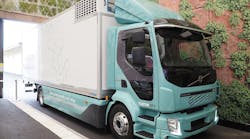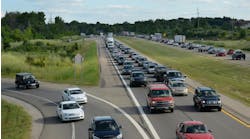Last week there was a big announcement that Daimler Truck AG and the Volvo Group had signed a preliminary non-binding agreement to establish a new joint venture to develop, produce and commercialize fuel cell systems for heavy-duty vehicle applications.
Martin Lundstedt, Volvo Group president and CEO, said, “Electrification of road transport is a key element in delivering the so called Green Deal, a carbon neutral Europe and ultimately a carbon neutral world. Using hydrogen as a carrier of green electricity to power electric trucks in long-haul operations is one important part of the puzzle, and a complement to battery electric vehicles and renewable fuels.”
It is interesting to me that when people talk about alternative fueled vehicles, they talk about battery electric vehicles and fuel cell electric vehicles as if they have nothing in common with each other. It reminds me of that old Gershwin song Let’s Call The Whole Thing Off. The reality is that the fuel cell is just another way to store energy on board. That being said, the fuel cell battery electric vehicle is not as efficient as a pure battery electric vehicle.
In our most recent Guidance Report, Viable Class 7/8 Electric, Hybrid & Alternative Fuel Tractors we found that the energy conversion efficiency of a battery electric drivetrain is in the range of 90% or better range, while that of fuel cell better electric vehicles has a conversion efficiency between 45% and 55%.
During what we at NACFE are calling “the messy middle,” we will see lots of development in cleaner ways to power heavy duty trucks — CNG/LNG, hybrid diesel electric, commercial battery electric vehicles, fuel cell electric vehicles and advanced diesels. I applaud everyone that is making an effort to help trucking reduce its carbon footprint and get to a cleaner future. However, ultimately as our report found commercial battery electric vehicles from clean energy will emerge as the power source that makes the most sense across a range of duty cycles and applications. In addition, fast charging systems will be widely available, long life batteries will have been developed and they will be available at a lower cost and weigh less than current iterations.
The future is electric, and we expect battery power alone will work in many applications but adding a fuel cell to help with range and fueling time will be a valuable part of that future.



